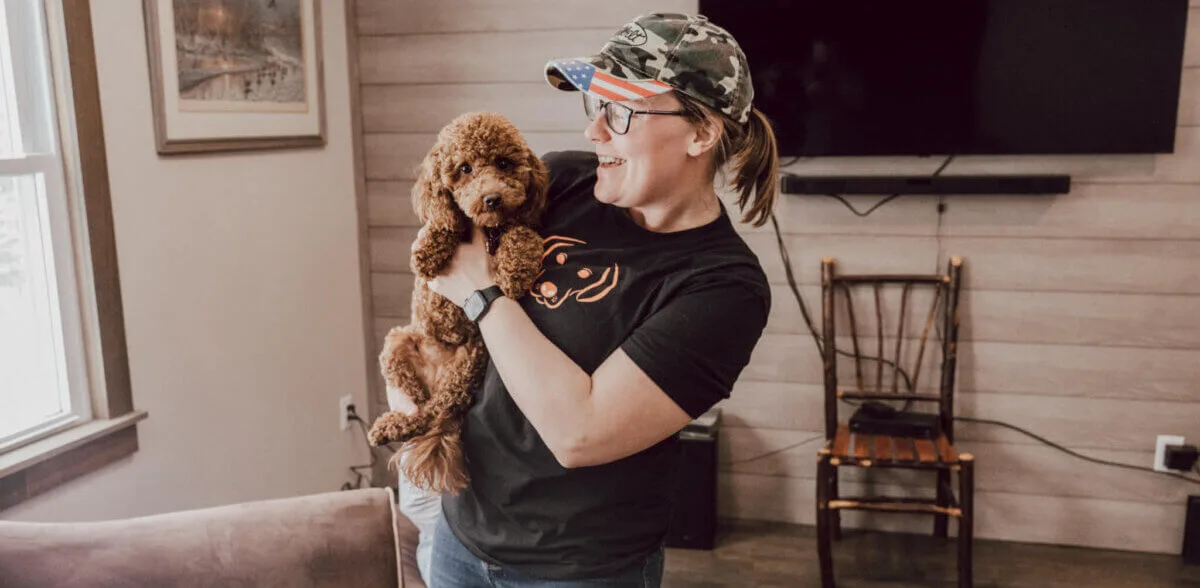
Pawsitively K9 owner Nicole Ernsberger handles dog training for the Michigan Veteran K9 Coalition. (Courtesy/Redemption Cannabis)
Many veterans with post-traumatic stress disorder have turned to cannabis instead of prescription drugs. Now cannabis companies are giving back to the veterans—through a new coalition that helps connect emotional support dogs with those who need them most.
MICHIGAN—Nearly 900 Michigan veterans died by suicide between 2016 and 2020.
That’s an average of 176 people lost every year over five years, federal data shows.
It’s a tragedy that government agencies and nonprofit groups have been fighting against for decades. But this year, a new—and perhaps rather unlikely—battalion has joined the frontlines:
The Michigan Veteran K9 Coalition is a troop of Michigan cannabis companies working to connect as many veterans as possible with their new best friends: trained emotional support dogs who can stick by their sides and provide some much-needed companionship.
“A lot of times, veterans who are struggling can benefit so much from the simple joy that dogs can bring into their lives,” said Nate Darling, marketing director for Redemption Cannabis, which helped launch the coalition alongside several other big-name cannabis companies last year.

Research shows that about 7% of veterans will struggle with post-traumatic stress disorder at some point in their lives—sometimes years after returning home from their time in the military. Veterans also face disproportionately higher rates of depression and other mental illnesses.
And with veterans across the country also struggling with comparatively higher rates of homelessness, unemployment, substance abuse and inadequate mental health support, the rate of veteran suicide is now nearly 60% higher than those who haven’t served in the military.
“PTSD can affect their relationships and their jobs—everything in their lives. They may feel misunderstood or isolated. They can feel scared and frustrated and mad,” Darling said. “A lot of times, that can also turn into substance abuse. But having a loving creature around that’s always there for you, sometimes that can be better than any anti-depressant in the world.”
Spending quality time with dogs isn’t just a common-sense mood booster, either. It’s science.
Studies have shown that service dogs can help people with PTSD greatly reduce the severity of their symptoms and ultimately learn to have more enjoyable social interactions. One 2022 study found that veterans with service dogs, in particular, spent more than 80% of their day with their pups—mostly to help calm anxiety and find a general sense of comfort throughout the day.
Weed, Vets and Doggos: A Match Made in Michigan
Since weed was legalized for recreational use in Michigan, many pot shops have discovered veterans to be some of their most frequent customers—many looking to quell PTSD-related irritability, insomnia, and anxiety with anything other than prescription drugs.
And since dogs had a proven history of helping veterans, too, it only made sense to form a joint operation.
“We already understood that cannabis was helping veterans with all sorts of issues, and we also saw that [emotional support dogs] had worked for them too—so we put it together,” said Hilary Dulany, owner of founding partner Aardvark Industrees, which grows weed for the Cheech’s Stash brand in Michigan. “I think that’s just the nature of the cannabis industry: to help people.”

The Office of Veterans’ Affairs in St. Joseph County has long recognized the healing benefits of canine companionship for veterans and for years has connected local veterans with the resources needed to get their own support dogs—each trained to meet their own specific needs.
To date, more than 30 dogs have been placed into new homes with veterans in St. Joseph County through its countywide program. And officials there have cited broad success in helping veterans reduce stress, manage anxiety and restore lost confidence associated with PTSD.
The Michigan Veteran K9 Coalition was launched as a direct extension of that program and aims to provide the county with enough cash to expand the initiative to every corner of the state. Over the last year, the coalition has enabled two dogs to be placed with veterans outside of the county—with three more pooches waiting in the wings, still looking for their forever homes.
Darling added: “It’s the same philosophy that we bring to everything we do at Redemption: It’s about positively impacting people, one life at a time. Veterans can feel like the world is leaving them behind, and that breaks my heart, and we’re going to do anything we can to change that.”
‘A Real Help’
Ron Kothe thinks of his dog as his own personal therapist.
After serving 11 years in the US Army and the National Guard, Kothe—like many other veterans—was having trouble readjusting to citizen life outside the military. And after another ten years hauling steel for a local trucking company, he felt the toll on his mental health.
“Things just started falling apart for me,” Kothe said. “I ended up getting a dog around the same time that I was starting to have some serious issues. … I just don’t think people understand how quickly having a dog can de-stress a situation—like any situation. They can be a real help.”

Counseling helped too, but the companionship that man’s best friend offered was priceless, Kothe said. And this year, after losing his long-time companion who helped him navigate through some of his darkest times, he was able to get a new buddy through the Coalition.
His name is Stoney.
“He’s fun to take around,” Kothe said. “I think we’re doing pretty good. He’s a helper.”
He added: “I have another, bigger dog—but he can be pretty high energy. There are times when you’re just not wanting that all high energy, and I think Stoney really fills that spot for me. He likes to relax, and he helps sort of decompress. He just helps take the stress off of the day.”

Officials emphasized that emotional support dogs needn’t always be breeds one might expect to take the job—like golden retrievers or German shepherds. They can also be tiny and cute. Stoney is a Pomeranian. Mollie, the first dog to go out through the program, is a poodle mix.
“We’ve had her for one day now, and she’s very comfortable with us,” owner Tina Boisvert said in a video. “She’s going to be a wonderful emotional support dog. We already have love there.”
How Does the Program Work?
Michigan veterans who think they could benefit from an emotional support dog can request one by filling out an online application. From there, the Michigan Veteran K9 Coalition and the St. Joseph County Office of Veteran Affairs will handle the rest—from finding, fostering and training the right dog for the right veteran, to ensuring their home is a good fit for their new best friend.
The initiative is funded entirely through donations, both from kind-hearted Michiganders who are willing to chip in and directly from the proceeds of the founding companies’ cannabis sales.
All donations that come in through the Coalition are explicitly earmarked for veterans and dogs located outside of St. Joseph County, with the goal of growing the program statewide.
An important distinction: Officials said the dogs offered through the Coalition are not defined as service or “therapy” dogs trained to perform specific tasks associated with alerting to medical symptoms. Instead, they’re better classified more broadly as “emotional support” dogs.
How Can I Help?
Darling said the Coalition has already raised more than $25,000 within the last year. A $5,000 donation is enough to sponsor one dog—and the donor even gets to name the dog before it goes off to training. Of course, additional donations are always welcomed and appreciated.
Click here to make a donation. Click here to sign up to foster a dog.

This article originally appeared in The MichiGanja Report, a free monthly newsletter from The ‘Gander about all things cannabis, written by political correspondent Kyle Kaminski. Click here to subscribe, and we’ll send the next edition straight to your inbox.
Politics

SEIU workers ahead of NFL Draft: We are ‘the backbone of Detroit’
BY KEN COLEMAN, MICHIGAN ADVANCE MICHIGAN—A day ahead of the National Football League annual draft being held in Detroit, Service Employees...

Investigator says Trump, allies were uncharged co-conspirators in plot to overturn Michigan election
DETROIT—A state investigator testified Wednesday that he considers former President Donald Trump and his White House chief of staff to be uncharged...

Michigan Dems introduce ‘Child Care for All’ legislation to lower costs for families
Lawmakers say Michigan is facing a ‘child care crisis.’ But a series of bills introduced this month would help to make child care (much) more...
Local News

The 10 best burger joints in and around Lansing
Warning: Do not read this list if you missed lunch or you will find yourself hopping in the car to drive to these best burger joints in Lansing. ...

10 unique wedding venues in Michigan to suit every kind of couple
From a distillery in Detroit to a summer camp, we’ve rounded up some of Michigan’s most unique wedding venues. Of all the elements you need to...






